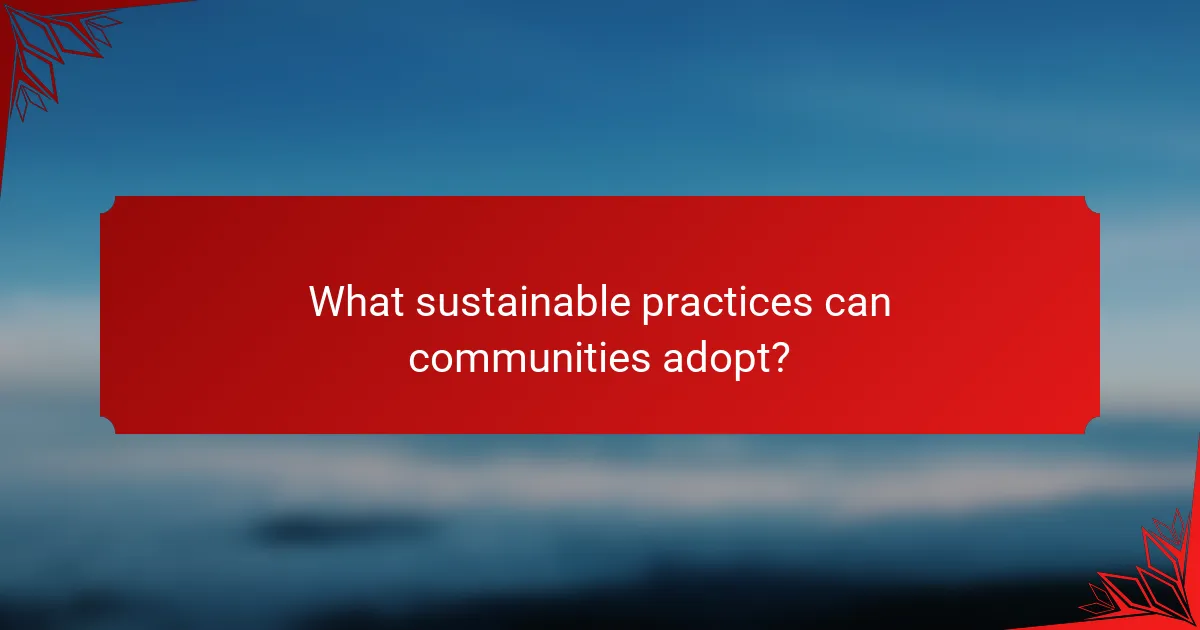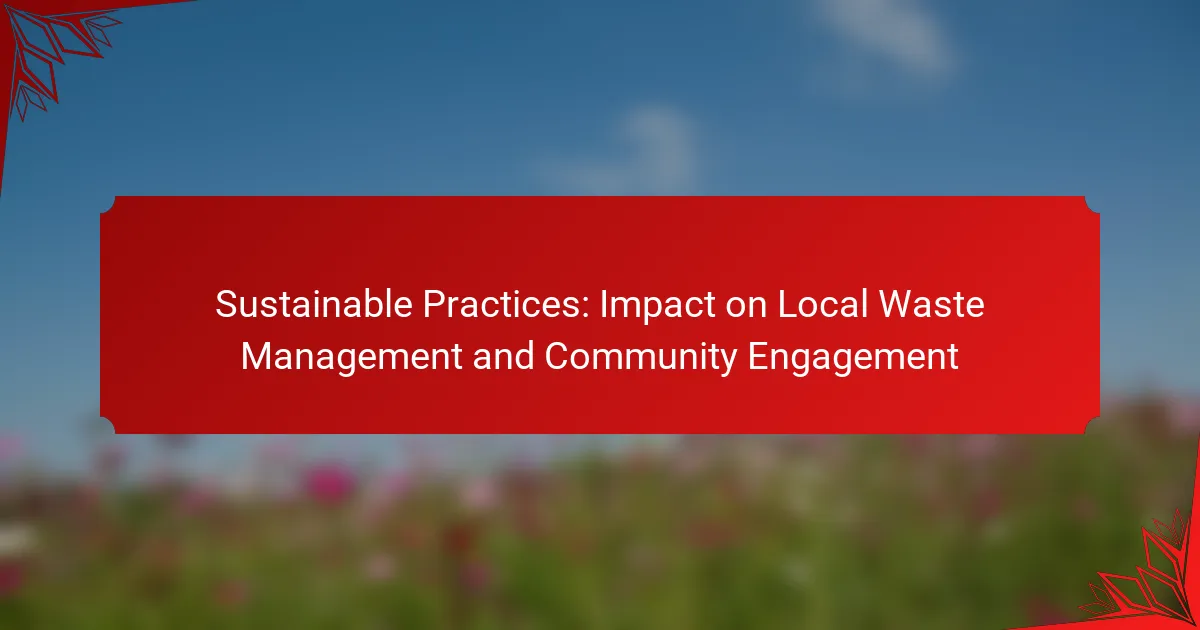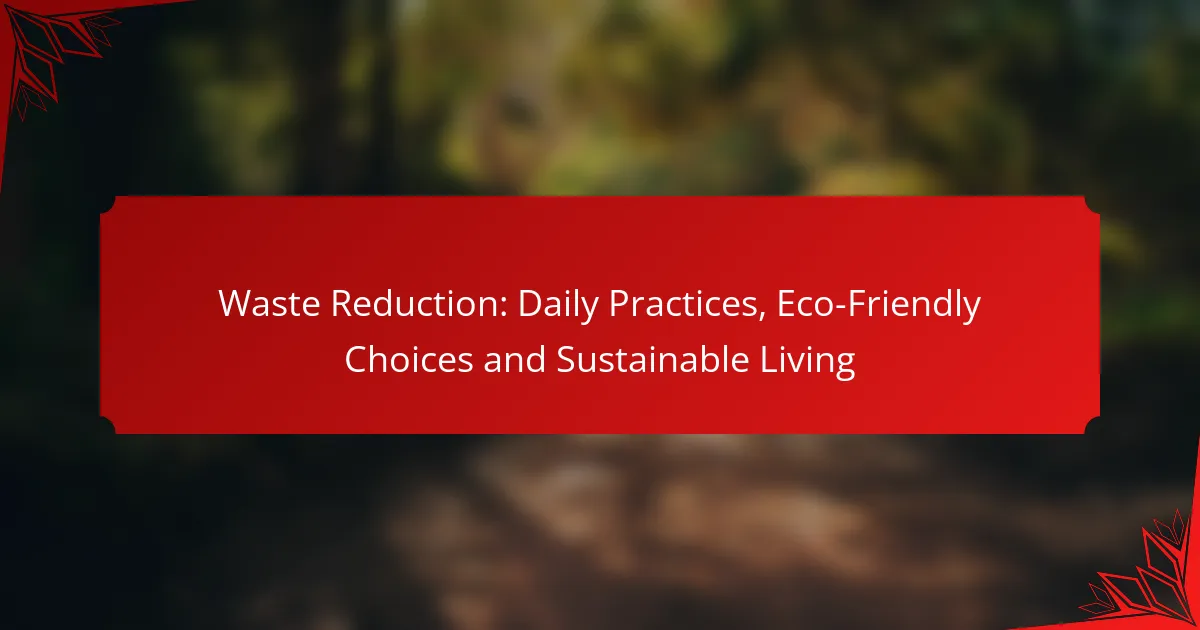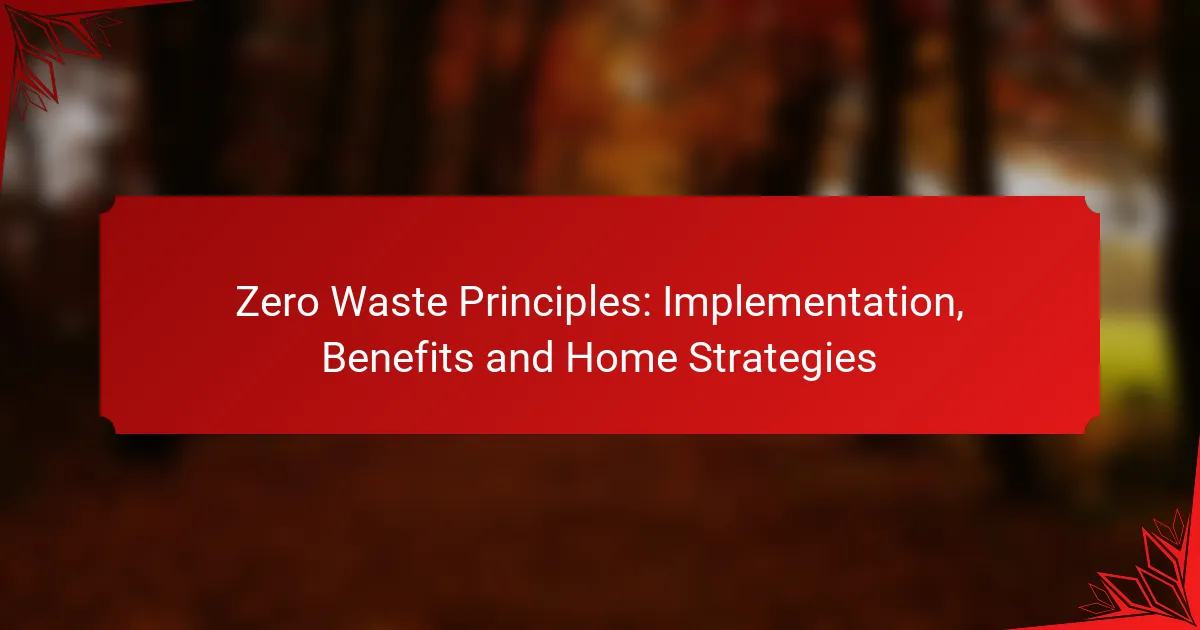Sustainable practices play a crucial role in improving local waste management by minimizing waste generation and enhancing recycling initiatives. By fostering a sense of responsibility and engagement within communities, these practices not only lead to more effective waste solutions but also promote awareness and participation in environmental issues.

How do sustainable practices impact local waste management?
Sustainable practices significantly enhance local waste management by reducing the amount of waste generated and improving recycling efforts. These practices foster a culture of responsibility and engagement within communities, leading to more effective waste solutions.
Reduction in landfill waste
Implementing sustainable practices, such as composting and minimizing single-use plastics, directly reduces the volume of waste sent to landfills. Communities can achieve a reduction of landfill waste by adopting strategies like waste segregation and encouraging the use of reusable products.
For example, cities that promote composting can divert a substantial portion of organic waste from landfills, which not only conserves space but also reduces greenhouse gas emissions. Local governments can support these initiatives by providing resources and education to residents.
Improved recycling rates
Sustainable practices lead to improved recycling rates by making recycling more accessible and efficient. Communities that implement curbside recycling programs and provide clear guidelines on recyclable materials typically see higher participation and lower contamination rates.
In many regions, effective public awareness campaigns can increase recycling rates by tens of percent. For instance, educational workshops and community events can inform residents about the importance of recycling and how to do it correctly, thus fostering a recycling culture.
Enhanced community awareness
Engaging in sustainable practices enhances community awareness about waste management issues. When residents participate in local sustainability initiatives, they become more informed about the environmental impacts of their waste and the importance of responsible disposal.
Community workshops, clean-up events, and educational programs can empower individuals to take action in their neighborhoods. By fostering a sense of ownership and responsibility, communities can create a collective effort towards reducing waste and promoting sustainability.

What sustainable practices can communities adopt?
Communities can adopt various sustainable practices to enhance waste management and foster community engagement. These practices not only reduce waste but also encourage local participation and awareness about environmental issues.
Composting programs
Composting programs involve collecting organic waste, such as food scraps and yard debris, and converting it into nutrient-rich compost. This practice reduces the volume of waste sent to landfills and enriches soil, promoting healthier gardens and landscapes.
To implement a composting program, communities can provide residents with bins and educational resources on what materials are compostable. Regular workshops can help residents understand the composting process and its benefits.
Zero waste initiatives
Zero waste initiatives aim to minimize waste generation by promoting recycling, reusing, and reducing consumption. Communities can set ambitious goals to divert waste from landfills, often targeting a reduction of waste by at least 90% over time.
Key steps include establishing recycling programs, encouraging businesses to adopt sustainable practices, and hosting educational campaigns to raise awareness. Local governments can also implement policies that support these initiatives, such as bans on single-use plastics.
Community clean-up events
Community clean-up events engage residents in cleaning local parks, streets, and waterways, fostering a sense of pride and responsibility for the environment. These events can be organized regularly, such as monthly or quarterly, to maintain community spaces and promote environmental stewardship.
To maximize participation, communities can partner with local organizations and businesses for sponsorship and resources. Providing incentives, such as refreshments or small prizes, can also encourage more residents to join in and contribute to cleaner surroundings.

How can local governments support sustainable practices?
Local governments can support sustainable practices by implementing policies that promote environmental stewardship and community involvement. This includes creating frameworks that encourage waste reduction, recycling, and sustainable resource management.
Policy development
Effective policy development is crucial for fostering sustainable practices at the local level. Governments should create regulations that incentivize waste reduction, such as mandates for recycling and composting programs. Additionally, policies that support the use of renewable energy sources can significantly impact local waste management.
Engaging with community stakeholders during the policy-making process ensures that the needs and concerns of residents are addressed. This collaboration can lead to more effective and widely accepted policies that promote sustainability.
Funding for green projects
Local governments can allocate funding for green projects that enhance sustainability and waste management efforts. This may include grants for community gardens, recycling initiatives, or renewable energy installations. By investing in these projects, governments can stimulate local economies while promoting environmentally friendly practices.
Leveraging state and federal funding opportunities can also amplify local efforts. Governments should actively seek partnerships with non-profit organizations and businesses to secure additional resources for sustainable initiatives.
Public education campaigns
Public education campaigns play a vital role in raising awareness about sustainable practices and waste management. Local governments should develop programs that inform residents about recycling guidelines, composting techniques, and the benefits of reducing waste. Engaging materials, such as workshops and informational brochures, can enhance community participation.
Utilizing social media and local events to disseminate information can further increase outreach. Encouraging community members to share their sustainability efforts can foster a culture of environmental responsibility and motivate others to participate.

What role do businesses play in community engagement?
Businesses play a crucial role in community engagement by fostering relationships that enhance local welfare and sustainability. Through various initiatives, they can significantly impact local waste management and promote active participation among community members.
Corporate social responsibility initiatives
Corporate social responsibility (CSR) initiatives are programs that businesses implement to contribute positively to society. These initiatives often focus on environmental sustainability, ethical labor practices, and community development. For example, a company might adopt a policy to reduce waste by implementing recycling programs or using eco-friendly materials in their products.
By aligning their operations with community needs, businesses can enhance their reputation and build trust. This can lead to increased customer loyalty and potentially higher sales, as consumers increasingly prefer brands that demonstrate social responsibility.
Partnerships with local organizations
Forming partnerships with local organizations allows businesses to leverage community knowledge and resources. Collaborating with non-profits or local government can lead to more effective waste management strategies, such as community clean-up events or educational campaigns on recycling. These partnerships can also help businesses identify specific local needs and tailor their initiatives accordingly.
For instance, a local restaurant may partner with a food bank to donate surplus food, reducing waste while supporting those in need. Such collaborations not only benefit the community but also enhance the business’s visibility and community ties.
Involvement in sustainability events
Businesses can engage with their communities by participating in sustainability events, such as local fairs, workshops, or environmental clean-up days. These events provide opportunities for businesses to showcase their commitment to sustainability and connect with community members directly. For example, sponsoring a local Earth Day event can highlight a company’s dedication to environmental issues.
Active involvement in these events can also serve as a platform for educating the community about waste management practices and sustainable living. By sharing resources and knowledge, businesses can empower individuals to take action, fostering a culture of sustainability within the community.

How can residents get involved in waste management initiatives?
Residents can engage in waste management initiatives by participating in local programs and collaborating with community members. These efforts not only reduce waste but also foster a sense of community and shared responsibility.
Participating in local workshops
Local workshops provide hands-on opportunities for residents to learn about effective waste management practices. These sessions often cover topics such as recycling, composting, and reducing single-use plastics.
Residents can find workshops hosted by municipalities, non-profits, or environmental organizations. Attending these workshops can enhance knowledge and provide practical skills that can be applied at home.
Joining community groups
Joining community groups focused on waste management allows residents to collaborate on initiatives that promote sustainability. These groups often organize clean-up events, educational campaigns, and recycling drives.
Participation in such groups can lead to greater community engagement and awareness. Residents can connect with like-minded individuals and share resources, making waste management efforts more effective and impactful.



